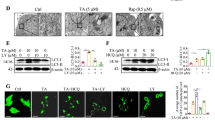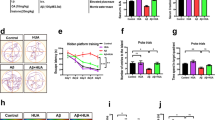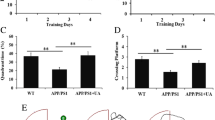Abstract
The NLR family, pyrin domain containing 3 (NLRP3) inflammasome drives the progression of Alzheimer’s disease (AD). Ginkgolide B (GB) is a potential anti-inflammatory compound that controls neuro-inflammation. The aim of this study was to evaluate the effect of GB on the NLRP3 inflammasome in AD. The effect of GB on the conversion between the M1 and M2 microglial phenotype was examined using quantitative real-time PCR and immunostaining. Western blotting assays and ELISA were used to detect changes in neuro-inflammation following GB treatment, including the NLRP3 inflammasome pathway and autophagy. In order to evaluate the cognitive function of male senescence-accelerated mouse prone 8 (SAMP8) mice, behavioral tests, including the Morris water maze and novel object recognition tests, were performed. GB significantly decreased the intracellular pro-inflammatory cytokine levels in lipopolysaccharide-treated BV2 cells and improved cognitive behavior in SAMP8 mice. Moreover, GB deactivated the NLRP3 inflammasome, and this effect was dependent on autophagy. Ubiquitination was associated with GB-induced autophagic NLRP3 degradation. These results were further validated in the hippocampus of SAMP8 mice. Thus, GB exerted a neuroprotective effect on the cognitive function of SAMP8 mice by suppressing the activation of NLRP3 inflammasome via autophagic degradation.








Similar content being viewed by others
Data availability
The datasets used and/or analyzed during the current study are available from the corresponding author on reasonable request.
References
Al Mamun A, Chauhan A, Qi S, Ngwa C, Xu Y, Sharmeen R et al (2020) Microglial IRF5-IRF4 regulatory axis regulates neuroinflammation after cerebral ischemia and impacts stroke outcomes. Proc Natl Acad Sci USA 117(3):1742–1752. https://doi.org/10.1073/pnas.1914742117
Birkenhager TK, van Diermen L (2020) Electroconvulsive therapy: we are hesitant to use the most effective treatment for severe depression. Acta Psychiatr Scand 141(4):301–303. https://doi.org/10.1111/acps.13171
Butterfield DA, Poon HF (2005) The senescence-accelerated prone mouse (SAMP8): a model of age-related cognitive decline with relevance to alterations of the gene expression and protein abnormalities in Alzheimer’s disease. Exp Gerontol 40(10):774–783. https://doi.org/10.1016/j.exger.2005.05.007
Chen T, Zheng M, Li Y, Liu S, He L (2020) The role of CCR5 in the protective effect of Esculin on lipopolysaccharide-induced depressive symptom in mice. J Affect Disord 277:755–764. https://doi.org/10.1016/j.jad.2020.08.065
Chen T, Liu S, Zheng M, Li Y, He L (2021) The effect of geniposide on chronic unpredictable mild stress-induced depressive mice through BTK/TLR4/NF-κB and BDNF/TrkB signaling pathways. Phytother Res 35(2):932–945. https://doi.org/10.1002/ptr.6846
Dai W, Wang X, Teng H, Li C, Wang B, Wang J (2019) Celastrol inhibits microglial pyroptosis and attenuates inflammatory reaction in acute spinal cord injury rats. Int Immunopharmacol 66:215–223. https://doi.org/10.1016/j.intimp.2018.11.029
Demishtein A, Fraiberg M, Berko D, Tirosh B, Elazar Z, Navon A (2017) SQSTM1/p62-mediated autophagy compensates for loss of proteasome polyubiquitin recruiting capacity. Autophagy 13(10):1697–1708. https://doi.org/10.1080/15548627.2017.1356549
Diaz-Perdigon T, Belloch FB, Ricobaraza A, Elboray EE, Suzuki T, Tordera RM et al (2020) Early sirtuin 2 inhibition prevents age-related cognitive decline in a senescence-accelerated mouse model. Neuropsychopharmacology 45(2):347–357. https://doi.org/10.1038/s41386-019-0503-8
Ding J, Davis-Plourde KL, Sedaghat S, Tully PJ, Wang W, Phillips C et al (2020) Antihypertensive medications and risk for incident dementia and Alzheimer’s disease: a meta-analysis of individual participant data from prospective cohort studies. Lancet Neurol 19(1):61–70. https://doi.org/10.1016/s1474-4422(19)30393-x
Du Y, Luo M, Du Y, Xu M, Yao Q, Wang K et al (2021) Liquiritigenin decreases Aβ levels and ameliorates cognitive decline by regulating microglia M1/M2 transformation in AD mice. Neurotox Res 39(2):349–358. https://doi.org/10.1007/s12640-020-00284-z
Duan R, Xue X, Zhang QQ, Wang SY, Gong PY, E Y et al (2020) ACE2 activator diminazene aceturate ameliorates Alzheimer’s disease-like neuropathology and rescues cognitive impairment in SAMP8 mice. Aging 12(14):14819–14829. https://doi.org/10.18632/aging.103544
Feng YS, Tan ZX, Wu LY, Dong F, Zhang F (2020) The involvement of NLRP3 inflammasome in the treatment of Alzheimer’s disease. Ageing Res Rev 64:101192. https://doi.org/10.1016/j.arr.2020.101192
Gargouri B, Carstensen J, Bhatia HS, Huell M, Dietz GPH, Fiebich BL (2018) Anti-neuroinflammatory effects of Ginkgo biloba extract EGb761 in LPS-activated primary microglial cells. Phytomedicine 44:45–55. https://doi.org/10.1016/j.phymed.2018.04.009
Han X, Sun S, Sun Y, Song Q, Zhu J, Song N et al (2019) Small molecule-driven NLRP3 inflammation inhibition via interplay between ubiquitination and autophagy: implications for Parkinson disease. Autophagy 15(11):1860–1881. https://doi.org/10.1080/15548627.2019.1596481
Hashiguchi M, Ohta Y, Shimizu M, Maruyama J, Mochizuki M (2015) Meta-analysis of the efficacy and safety of Ginkgo biloba extract for the treatment of dementia. J Pharm Health Care Sci 1:14. https://doi.org/10.1186/s40780-015-0014-7
Heneka MT, Kummer MP, Stutz A, Delekate A, Schwartz S, Vieira-Saecker A et al (2013) NLRP3 is activated in Alzheimer’s disease and contributes to pathology in APP/PS1 mice. Nature 493(7434):674–678. https://doi.org/10.1038/nature11729
Hou Z, Qiu R, Wei Q, Liu Y, Wang M, Mei T et al (2020) Electroacupuncture improves cognitive function in senescence-accelerated P8 (SAMP8) mice via the NLRP3/Caspase-1 pathway. Neural Plast 2020:8853720. https://doi.org/10.1155/2020/8853720
Huang X, Shen H, Liu Y, Qiu S, Guo Y (2021) Fisetin attenuates periodontitis through FGFR1/TLR4/NLRP3 inflammasome pathway. Int Immunopharmacol 95:107505. https://doi.org/10.1016/j.intimp.2021.107505
Ising C, Venegas C, Zhang S, Scheiblich H, Schmidt SV, Vieira-Saecker A et al (2019) NLRP3 inflammasome activation drives tau pathology. Nature 575(7784):669–673. https://doi.org/10.1038/s41586-019-1769-z
Jia Y, Cao N, Zhai J, Zeng Q, Zheng P, Su R et al (2020) HGF mediates clinical-grade human umbilical cord-derived mesenchymal stem cells improved functional recovery in a senescence-accelerated mouse model of Alzheimer’s disease. Adv Sci (Weinh) 7(17):1903809. https://doi.org/10.1002/advs.201903809
Jiang J, Ding N, Wang K, Li Z (2018) Electroacupuncture could influence the expression of IL-1β and NLRP3 inflammasome in hippocampus of Alzheimer’s disease animal model. Evid Based Complement Alternat Med 2018:8296824-8296824. https://doi.org/10.1155/2018/8296824
Jin X, Liu MY, Zhang DF, Zhong X, Du K, Qian P et al (2019) Baicalin mitigates cognitive impairment and protects neurons from microglia-mediated neuroinflammation via suppressing NLRP3 inflammasomes and TLR4/NF-κB signaling pathway. CNS Neurosci Ther 25(5):575–590. https://doi.org/10.1111/cns.13086
Karasawa J, Hashimoto K, Chaki S (2008) D-Serine and a glycine transporter inhibitor improve MK-801-induced cognitive deficits in a novel object recognition test in rats. Behav Brain Res 186(1):78–83. https://doi.org/10.1016/j.bbr.2007.07.033
Liu S, Zheng M, Li Y, He L, Chen T (2020) The protective effect of Geniposide on diabetic cognitive impairment through BTK/TLR4/NF-kappaB pathway. Psychopharmacology 237(2):465–477. https://doi.org/10.1007/s00213-019-05379-w
Mamik MK, Power C (2017) Inflammasomes in neurological diseases: emerging pathogenic and therapeutic concepts. Brain 140(9):2273–2285. https://doi.org/10.1093/brain/awx133
Mohamed NE, Abd El-Moneim AE (2017) Ginkgo biloba extract alleviates oxidative stress and some neurotransmitters changes induced by aluminum chloride in rats. Nutrition 35:93–99. https://doi.org/10.1016/j.nut.2016.10.012
Qi Y, Cheng X, Jing H, Yan T, Xiao F, Wu B et al (2019) Combination of schisandrin and nootkatone exerts neuroprotective effect in Alzheimer’s disease mice model. Metab Brain Dis 34(6):1689–1703. https://doi.org/10.1007/s11011-019-00475-4
Qin Y, Zhang Y, Tomic I, Hao W, Menger MD, Liu C et al (2018) Ginkgo biloba extract EGb 761 and its specific components elicit protective protein clearance through the autophagy-lysosomal pathway in tau-transgenic mice and cultured neurons. J Alzheimers Dis 65(1):243–263. https://doi.org/10.3233/jad-180426
Salminen A, Kaarniranta K, Kauppinen A (2012) Inflammaging: disturbed interplay between autophagy and inflammasomes. Aging 4(3):166–175. https://doi.org/10.18632/aging.100444
Saresella M, La Rosa F, Piancone F, Zoppis M, Marventano I, Calabrese E et al (2016) The NLRP3 and NLRP1 inflammasomes are activated in Alzheimer’s disease. Mol Neurodegener 11:23. https://doi.org/10.1186/s13024-016-0088-1
Schmittgen TD, Livak KJ (2008) Analyzing real-time PCR data by the comparative C(T) method. Nat Protoc 3(6):1101–1108. https://doi.org/10.1038/nprot.2008.73
Sharif H, Wang L, Wang WL, Magupalli VG, Andreeva L, Qiao Q et al (2019) Structural mechanism for NEK7-licensed activation of NLRP3 inflammasome. Nature 570(7761):338–343. https://doi.org/10.1038/s41586-019-1295-z
Stackman RW, Eckenstein F, Frei B, Kulhanek D, Nowlin J, Quinn JF (2003) Prevention of age-related spatial memory deficits in a transgenic mouse model of Alzheimer’s disease by chronic Ginkgo biloba treatment. Exp Neurol 184(1):510–520. https://doi.org/10.1016/s0014-4886(03)00399-6
Sun L, Ma W, Gao W, Xing Y, Chen L, Xia Z et al (2019) Propofol directly induces caspase-1-dependent macrophage pyroptosis through the NLRP3-ASC inflammasome. Cell Death Dis 10(8):542. https://doi.org/10.1038/s41419-019-1761-4
Tan MS, Yu JT, Tan CC, Wang HF, Meng XF, Wang C et al (2015) Efficacy and adverse effects of ginkgo biloba for cognitive impairment and dementia: a systematic review and meta-analysis. J Alzheimers Dis 43(2):589–603. https://doi.org/10.3233/JAD-140837
Tang Y, Le W (2016) Differential roles of M1 and M2 microglia in neurodegenerative diseases. Mol Neurobiol 53(2):1181–1194. https://doi.org/10.1007/s12035-014-9070-5
Vellas B, Andrieu S, Ousset PJ, Ouzid M, Mathiex-Fortunet H (2006) The GuidAge study: methodological issues. A 5-year double-blind randomized trial of the efficacy of EGb 761 for prevention of Alzheimer disease in patients over 70 with a memory complaint. Neurology 67(9 Suppl 3):S6–11. https://doi.org/10.1212/wnl.67.9_suppl_3.s6
Vellas B, Coley N, Ousset PJ, Berrut G, Dartigues JF, Dubois B et al (2012) Long-term use of standardised Ginkgo biloba extract for the prevention of Alzheimer’s disease (GuidAge): a randomised placebo-controlled trial. Lancet Neurol 11(10):851–859. https://doi.org/10.1016/S1474-4422(12)70206-5
Vitolo O, Gong B, Cao Z, Ishii H, Jaracz S, Nakanishi K et al (2009) Protection against beta-amyloid induced abnormal synaptic function and cell death by Ginkgolide J. Neurobiol Aging 30(2):257–265. https://doi.org/10.1016/j.neurobiolaging.2007.05.025
Wang WY, Tan MS, Yu JT, Tan L (2015) Role of pro-inflammatory cytokines released from microglia in Alzheimer’s disease. Ann Transl Med 3(10):136. https://doi.org/10.3978/j.issn.2305-5839.2015.03.49
Wang Y, Wang Q, Li J, Lu G, Liu Z (2019) Glutamine improves oxidative stress through the Wnt3a/beta-catenin signaling pathway in Alzheimer’s disease in vitro and in vivo. Biomed Res Int 2019:4690280. https://doi.org/10.1155/2019/4690280
Wang Y, Lin Y, Wang L, Zhan H, Luo X, Zeng Y et al (2020) TREM2 ameliorates neuroinflammatory response and cognitive impairment via PI3K/AKT/FoxO3a signaling pathway in Alzheimer’s disease mice. Aging 12(20):20862–20879. https://doi.org/10.18632/aging.104104
Xie Z, Lu H, Yang S, Zeng Y, Li W, Wang L et al (2020) Salidroside attenuates cognitive dysfunction in senescence-accelerated mouse prone 8 (SAMP8) mice and modulates inflammation of the gut-brain axis. Front Pharmacol 11:568423. https://doi.org/10.3389/fphar.2020.568423
Yan Y, Yang H, Xie Y, Ding Y, Kong D, Yu H (2020) Research progress on Alzheimer’s disease and resveratrol. Neurochem Res 45(5):989–1006. https://doi.org/10.1007/s11064-020-03007-0
Yang Y, Li S, Huang H, Lv J, Chen S, Dias P et al (2020) Comparison of the protective effects of ginsenosides Rb1 and Rg1 on improving cognitive deficits in SAMP8 mice based on anti-neuroinflammation mechanism. Front Pharmacol 11:834. https://doi.org/10.3389/fphar.2020.00834
Yin J, Zhao F, Chojnacki JE, Fulp J, Klein WL, Zhang S et al (2018) NLRP3 inflammasome inhibitor ameliorates amyloid pathology in a mouse model of Alzheimer’s disease. Mol Neurobiol 55(3):1977–1987. https://doi.org/10.1007/s12035-017-0467-9
Yin JJ, He Y, An J, Miao Q, Sui RX, Wang Q et al (2019) Dynamic balance of microglia and astrocytes involved in the remyelinating effect of ginkgolide B. Front Cell Neurosci 13:572. https://doi.org/10.3389/fncel.2019.00572
Zhang Y, Liu J, Yang B, Zheng Y, Yao M, Sun M et al (2018) Ginkgo biloba extract inhibits astrocytic lipocalin-2 expression and alleviates neuroinflammatory injury via the JAK2/STAT3 pathway after ischemic brain stroke. Front Pharmacol 9:518. https://doi.org/10.3389/fphar.2018.00518
Zhang Y, Dong Z, Song W (2020) NLRP3 inflammasome as a novel therapeutic target for Alzheimer’s disease. Signal Transduct Target Ther 5(1):37. https://doi.org/10.1038/s41392-020-0145-7
Funding
This work was supported by the fifth phase of “Project 333” Scientific Research Project Funding Plan of Jiangsu Province (BRA2019238), Medical Key Youth Talents Training Project of Jiangsu Province (QNRC2016367), Xuzhou Science and Technology Plan Project (KC19020) and Science and Technology Development Fund Project of Xuzhou Medical University Affiliated Hospital (XYFM2020024).
Author information
Authors and Affiliations
Contributions
LX and CD were involved with the experimental design and analyzed data; QH and YS performed the animal research; LX performed the other research and wrote the manuscript; DG provided technical support, experimental supervision, and the final revision of the manuscript. All authors have read and approved final version of the manuscript.
Corresponding author
Ethics declarations
Conflict of interest
The authors declare that there are no conflicts of interest.
Ethics approval and consent to participate
All animal procedures were in accordance with the Medical Ethics Committee of Xuzhou Medical University (Jiangsu, China).
Consent for publication
We declare that this manuscript is original, has not been published before and is not currently being considered for publication elsewhere. We confirm that the manuscript has been read and approved by all named authors for publication.
Additional information
Publisher’s note
Springer Nature remains neutral with regard to jurisdictional claims in published maps and institutional affiliations.
Rights and permissions
About this article
Cite this article
Shao, L., Dong, C., Geng, D. et al. Ginkgolide B inactivates the NLRP3 inflammasome by promoting autophagic degradation to improve learning and memory impairment in Alzheimer’s disease. Metab Brain Dis 37, 329–341 (2022). https://doi.org/10.1007/s11011-021-00886-2
Received:
Accepted:
Published:
Issue Date:
DOI: https://doi.org/10.1007/s11011-021-00886-2




